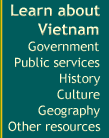At the start, with primitive and rudimentary cognition of materialism
and dialectics, Vietnamese thought was mixed with beliefs.
However, originating from agricultural culture that differs from
nomadic culture by the appreciation of stillness over movement and
closely related to natural phenomena, the Vietnamese philosophy
paid special attention to relations that was typified by doctrine of
yin and yang and the five basic elements (not exactly the
same as
the Chinese doctrine) and manifested by the moderate lifestyle
tending towards harmony.
Afterwards, the influence of Buddhism, Confucianism and Taoism,
that were conciliated and Vietnamized, contributed to the
development of the Vietnamese society and culture. Particularly,
Zen-Buddhists in the Tran dynasty came up with the interpretation
of most philosophical subjects that was set forth by Buddhism
(Heart- Buddha, being or not being, life and death) in an original
and distinguished way. Although Confucianism flourished afterward,
many famous Vietnamese confucianists did not stick blindly to
Confucianism and Mencianism, but rather adopted the spirit of
Buddhism and Taoism to make their ideology more open, closer to
the people and more harmonious with the nature.
Under autocratic dynasties, deep feudal ideologies were imposed
on farmers and bound women, however, village democracy and
primitive community still existed on the basis of self-supplied
agriculture. Farmers’ thoughts that penetrated deeply into the
Vietnamese agricultural society had many positive and typical
features of the traditional Vietnamese. Farmers were the core of
wars of resistance and uprisings against foreign invaders. Many
talented generals, topped by Quang Trung Nguyen Hue - the hero
of the common people in the 18th century, came from farmers.
The policy that facilitated agriculture and restrained trade,
prevailing
in the Nguyen dynasty, blocked the development of city-dweller's
consciousness. In the past, the Vietnamese ranked agriculture
and education as their first and second priorities of occupations,
while having a low opinion of business people. Other trades were
regarded as minor ones, including cultural activities.
In the 19th century when Vietnamese feudalism faded and Chinese
civilization declined, Western culture started to penetrate our
countries, following the colonialists’ guns. The working class formed
at the start of the 20th century as a result of the colonial exploitation
programs. Marxism-Leninism was introduced in Vietnam in the '20s
and '30s, combining with patriotism to become a momentum of
historical changes, which led the country up to independence,
democracy and socialism. The person representing this era was Ho
Chi Minh, who was recognized by the international community and
UNESCO as Vietnamese hero of national liberation and great man
of culture. The ailing national bourgeoisie could only implement a
number of partial reforms in the first half of the 20th century.
That Vietnam did not have its own philosophical and ideological
theoretical system and lacked world-class philosophers does not
mean that it does not have ways of living and ideologies suitable to
its nation.
The agricultural society is characterized by the village community
with many prolonged primitive vestiges that have formed the specific
characteristics of the Vietnamese. Those were the thoughts of
dualism, a concrete way of thinking that was tilted to emotional
experiences rather than rationalism and preferred images to
concepts. However, it was also a flexible, adaptable, and
conciliatory way of thinking. This was a way of living that highly
valued emotional ties and attachment to relatives and the community
(because "there would be no home in a lost country" and
"the whole
village rather than a sole roof would be engulfed by flood"). This
was a way of behaving toward conciliatory, equilibrium and
relations-based settlement of conflicts and disputes. This way of
living could cope accordingly with the situation, which many times in
the history was successful in using suppleness to prevail over
firmness and weakness to resist strength.
On the scale of spiritual values, the Vietnamese highly appreciate
"Benevolence" and closely combined it with
"Righteousness" and
"Virtues"; no benevolence and righteousness are tantamount to no
virtues. Nguyen Trai once described the Vietnamese concept of
Benevolence and Righteousness as the opposition to fierce violence,
which was enhanced to the foundation for the policy of ruling as
well as saving the country. The Vietnamese understood that Loyalty
meant being loyal to the nation, which was higher than the loyalty to
the ruler, and respected Piety without being so bound with the
framework of family. Happiness was also among the top social
values; people often make compliments on the happiness of a family
rather than wealth and social position.
On the road of industrialization, modernization and integration into
the international community, Vietnam will have to overcome some
shortcomings in its traditional culture like conservatism, and
parochialism, egalitarism, and the weakness in practical organization
...











